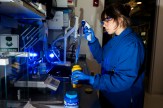Engine of success
On a Saturday in late August, Brian Hult arrived at a car dealership in Coldwater, Michigan, to show off his line of high-quality performance parts to Ford Focus enthusiasts who gathered to discuss the popular compact vehicle.
It was the latest step in an entrepreneurial venture that started three years ago, but that really took off after Hult enrolled in the master’s program at Northeastern’s School of Technological Entrepreneurship (STE).
Hult received his degree from STE in August, and his company, HTPerformance, was his “I-Cubator” project—the required business-development project that spans the three-semester master’s program.
“At Northeastern, students get a true entrepreneurial experience,” says STE dean Paul Zavracky. “The only way to do that is to start a real company; otherwise, it’s just some fake project that’s not going to go anywhere.”
There is nothing fake about HTPerformance, which develops parts for the Ford Focus automotive aftermarket, a branch of the auto industry that manufactures, sells and installs vehicle parts after the sale of the car by the original equipment manufacturer.
And the impact of the technological entrepreneurship program on his business is just as genuine, says Hult. “The program really taught me to determine whether the market was of significant size and how to discover the unmet needs within the market,” he explains, “so that we could determine whether we could build the business to an appreciable size.”
The self-proclaimed “car fanatic” used a yearlong project-development course in the technological entrepreneurship program to conduct market research on popular Internet forums such as Focaljet.com and focusfanatics.com (the start-up’s target demographic is 19-27-year-old males with a high school education or better who make between $25,000 and 50,000 per year), fine-tune his business model and develop more prototypes.
The master’s program culminates in a presentation to a panel of external mentors and investors who offer their opinion regarding the future potential of each venture, which helps the entrepreneurs sharpen their focus.
Together, with cofounder Jason Borden, who studied sustainable product design and innovation at Keene State College, Hult has been bullish in making sure his start-up continues to build momentum. The duo began selling parts–adjustable suspension components, lightweight battery boxes and intake and exhaust products, to name a few–just eight months ago, and havedeveloped a growing customer base. They leased a 2,000-square-foot space in Bridgewater, Massachusetts, to manufacture parts and conduct research and development, and hope to tweak their products to fit at least 10 different models within the next five years.
The marketing event in Michigan was a quick and easy way to grab the attention of car lovers. “Introducing our products to customers face-to-face is a great way of getting feedback,” says Hult, who earlier this year visited “Focus Fest,” a national event for car enthusiasts in Centerville, Arkansas. “Plus, we’re able to find out what they’re interested in and how we can address their needs.”
Hult says he’s not worried about the larger, more established high-performance auto parts makers. “Our company is positioning itself as offering a premium product,” he explains. “Other companies don’t pay much attention to the quality of the parts, and we’ve seen quite a few failures on aftermarket parts.
“We’re really investing in the engineering and design of our components, as well as the quality and precision of manufacturing.”
“HTP is growing tremendously,” adds Dan Gregory, a senior academic specialist in the School of Technological Entrepreneurship and the I-Cubator director for digital media projects. He’s impressed by the company’s innovative approach to tapping into the $257 billion auto aftermarket industry; the sports compact vehicle sector that includes the Focus represents $6 billion in annual sales alone.
“The number of people coming to their Web site is increasing and sales are increasing,” Gregory says. “They’re using technology in a really interesting way and demonstrating the technological superiority of their products. It’s definitely a business that can sustain itself.”





